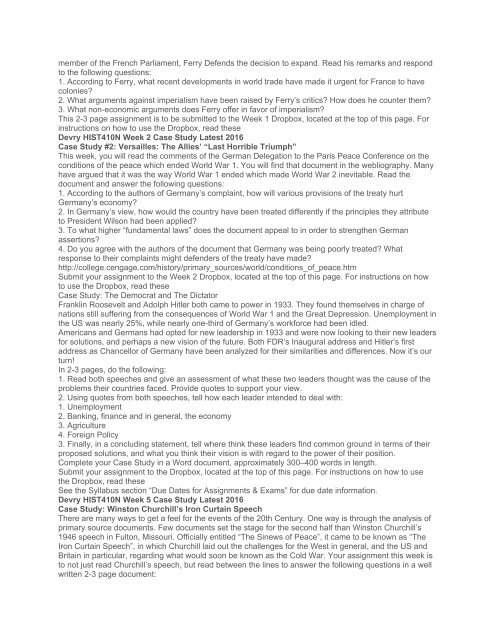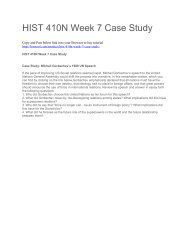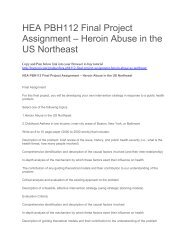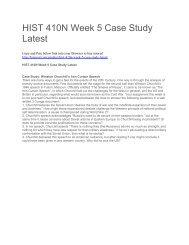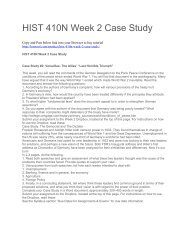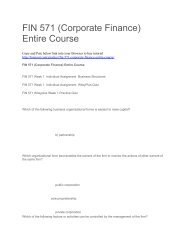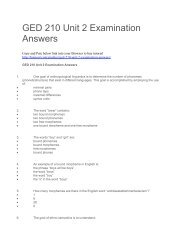HIST410N Full course latest all weeks discussions all case study Midterm Exam
Create successful ePaper yourself
Turn your PDF publications into a flip-book with our unique Google optimized e-Paper software.
member of the French Parliament, Ferry Defends the decision to expand. Read his remarks and respond<br />
to the following questions:<br />
1. According to Ferry, what recent developments in world trade have made it urgent for France to have<br />
colonies?<br />
2. What arguments against imperialism have been raised by Ferry’s critics? How does he counter them?<br />
3. What non-economic arguments does Ferry offer in favor of imperialism?<br />
This 2-3 page assignment is to be submitted to the Week 1 Dropbox, located at the top of this page. For<br />
instructions on how to use the Dropbox, read these<br />
Devry <strong>HIST410N</strong> Week 2 Case Study Latest 2016<br />
Case Study #2: Versailles: The Allies’ “Last Horrible Triumph”<br />
This week, you will read the comments of the German Delegation to the Paris Peace Conference on the<br />
conditions of the peace which ended World War 1. You will find that document in the webliography. Many<br />
have argued that it was the way World War 1 ended which made World War 2 inevitable. Read the<br />
document and answer the following questions:<br />
1. According to the authors of Germany’s complaint, how will various provisions of the treaty hurt<br />
Germany’s economy?<br />
2. In Germany’s view, how would the country have been treated differently if the principles they attribute<br />
to President Wilson had been applied?<br />
3. To what higher “fundamental laws” does the document appeal to in order to strengthen German<br />
assertions?<br />
4. Do you agree with the authors of the document that Germany was being poorly treated? What<br />
response to their complaints might defenders of the treaty have made?<br />
http://college.cengage.com/history/primary_sources/world/conditions_of_peace.htm<br />
Submit your assignment to the Week 2 Dropbox, located at the top of this page. For instructions on how<br />
to use the Dropbox, read these<br />
Case Study: The Democrat and The Dictator<br />
Franklin Roosevelt and Adolph Hitler both came to power in 1933. They found themselves in charge of<br />
nations still suffering from the consequences of World War 1 and the Great Depression. Unemployment in<br />
the US was nearly 25%, while nearly one-third of Germany’s workforce had been idled.<br />
Americans and Germans had opted for new leadership in 1933 and were now looking to their new leaders<br />
for solutions, and perhaps a new vision of the future. Both FDR’s Inaugural address and Hitler’s first<br />
address as Chancellor of Germany have been analyzed for their similarities and differences. Now it’s our<br />
turn!<br />
In 2-3 pages, do the following:<br />
1. Read both speeches and give an assessment of what these two leaders thought was the cause of the<br />
problems their countries faced. Provide quotes to support your view.<br />
2. Using quotes from both speeches, tell how each leader intended to deal with:<br />
1. Unemployment<br />
2. Banking, finance and in general, the economy<br />
3. Agriculture<br />
4. Foreign Policy<br />
3. Fin<strong>all</strong>y, in a concluding statement, tell where think these leaders find common ground in terms of their<br />
proposed solutions, and what you think their vision is with regard to the power of their position.<br />
Complete your Case Study in a Word document, approximately 300–400 words in length.<br />
Submit your assignment to the Dropbox, located at the top of this page. For instructions on how to use<br />
the Dropbox, read these<br />
See the Syllabus section “Due Dates for Assignments & <strong>Exam</strong>s” for due date information.<br />
Devry <strong>HIST410N</strong> Week 5 Case Study Latest 2016<br />
Case Study: Winston Churchill’s Iron Curtain Speech<br />
There are many ways to get a feel for the events of the 20th Century. One way is through the analysis of<br />
primary source documents. Few documents set the stage for the second half than Winston Churchill’s<br />
1946 speech in Fulton, Missouri. Offici<strong>all</strong>y entitled “The Sinews of Peace”, it came to be known as “The<br />
Iron Curtain Speech”, in which Churchill laid out the ch<strong>all</strong>enges for the West in general, and the US and<br />
Britain in particular, regarding what would soon be known as the Cold War. Your assignment this week is<br />
to not just read Churchill’s speech, but read between the lines to answer the following questions in a well<br />
written 2-3 page document:


